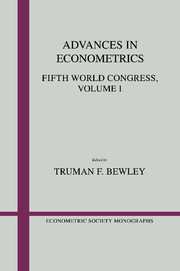Book contents
- Frontmatter
- 1 Specification testing in dynamic models
- 2 Specification tests: an overview
- 3 Kernel estimators of regression functions
- 4 Identification and consistency in semi-nonparametric regression
- 5 On econometric models with rational expectations
- 6 Calculating asset prices in three example economies
- 7 The Kalman filter: applications to forecasting and rational-expectations models
- 8 Applications of the Kalman filter in econometrics
7 - The Kalman filter: applications to forecasting and rational-expectations models
Published online by Cambridge University Press: 05 January 2013
- Frontmatter
- 1 Specification testing in dynamic models
- 2 Specification tests: an overview
- 3 Kernel estimators of regression functions
- 4 Identification and consistency in semi-nonparametric regression
- 5 On econometric models with rational expectations
- 6 Calculating asset prices in three example economies
- 7 The Kalman filter: applications to forecasting and rational-expectations models
- 8 Applications of the Kalman filter in econometrics
Summary
Introduction
Economics is not engineering; yet, perhaps, we can track the economy using the same tools used to track a spacecraft, an oil tanker, or a chemical reaction. In the 25 years since the publication of the original Kalman (1960) and Kalman and Bucy (1961) papers that introduced digital filters for nonstationary problems, economists have been studying these possibilities, and the presence of the August 1985 session of the World Congress of the Econometric Society suggests that it is still a question of great interest.
The initial attempts to apply these methods to economic problems immediately faced a major difficulty. Engineers usually had quantitative theories that described the equations of motion of physical systems and were primarily interested in estimates of the “state” of the system obtained from noisy measurements. The extraction of estimates of such signals from noise was called the estimation, or “state estimation,” problem. Economists, however, knew far less about the fundamental laws of motion of economic systems and were therefore particularly interested in discovering such laws of motion from the noisy data rather than in merely estimating the state of the economy. Since the Kalman filter takes the parameters of the process as given in estimating the state, it appeared that there would be little possibility to apply such methods in economics.
- Type
- Chapter
- Information
- Advances in EconometricsFifth World Congress, pp. 245 - 284Publisher: Cambridge University PressPrint publication year: 1987
- 28
- Cited by



